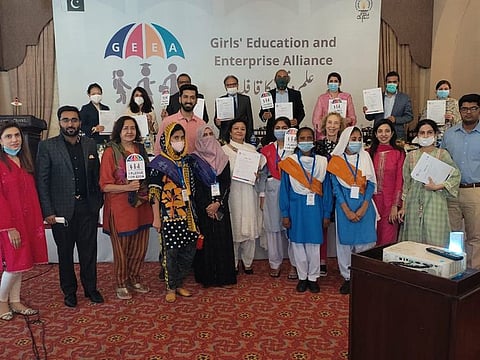Pakistan: Alliance to help girls get education, learn skills to make a living
Girls supported by Malala Fund share their dreams of success, pledge to change the world

Also In This Package
Islamabad; An alliance of local and international stakeholders was launched on Wednesday with a pledge to empower girls and young women of Pakistan through education and skill-learning.
The British High Commission, Ministry of Social Protection and Poverty Alleviation, Unicef, JICA, Oxfam, Malala Fund and a number of non-government organisations working in the field of girls’ education and women empowerment participated in the launching ceremony and commended the formation of the alliance which is titled Girls Education & Enterprise Alliance (GEEA).
The alliance is in fact an initiative of the Idara-e-Taleem-o-Aagahi (ITA), Centre for Education and Consciousness and according to its CEO Baela Raza Jamil, the purpose was to bring together parliamentarians, government, development partners, industry, education experts and civil society advocates on one platform to “Pledge for SMART Programmes” for out-of-school (OOS) girls/adolescents across Pakistan.
The ITA has been implementing several programmes on girls’ education, life skills and enterprise in collaboration with the government, development organizations, private sector and CSOs, she said.
While lauding the formation of the girls’ education alliance, High Commissioner of the UK, Dr Christian Turner said girls’ education was imperative for Pakistan’s growth and built richer, fairer and healthier societies. “I’m here to say that UK will help in this journey,” pledged the UK high commissioner.
Special Assistant to PM on Social Protection and Poverty Alleviation Senator Dr Sania Nishtar shared Prime Minister Imran Khan government’s resolve to promote girls education.
We are fully conscious that an educated girl can contribute more effectively to society, said she. Highlighting the cash assistance programme ‘Ehsaas’ for the marginalised segments and students from the less-privileged families, Sania Nishtar said Ehsaas conditional cash transfer (CCT) programmes were providing cash stipends for education and nutrition, skewed in favour of girls to safeguard gender equity.
Some beneficiaries of these programmes—Razia Munir a student of grade-7, Minahil Irfan, an Intermediate (1st Year) student, Laiba Noureen, grade-7, Saba, B.Sc and Kausar, B.A. shared their views about education as well as training that enabled them to learn and earn side by side.
Razia and Laiba are supported in their pursuits by the Malala Fund. They belong to the remote and the underdeveloped parts of the southern Punjab. “The programme has helped us not only to support our families but also to chase our dream of education,” they said.
I have a dream to be like you, a successful woman, said Laiba quoting Malala Yousafzai’s famous line: “One child, one teacher, one book, one pen can change the world.”
Sign up for the Daily Briefing
Get the latest news and updates straight to your inbox









